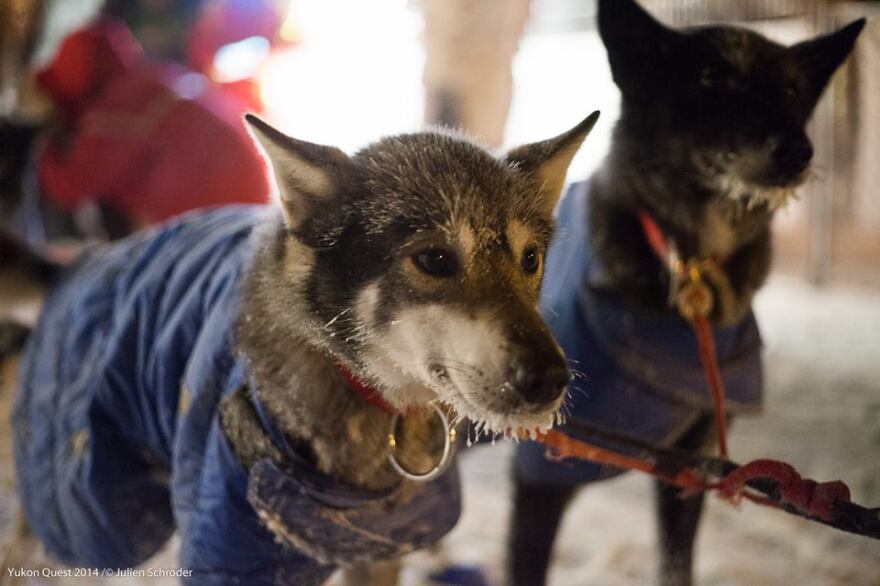Dawson City, YK - Teams arriving in Dawson over the last 24 hours have shared stories from their journey. The trail from Eagle threw everything from gusting winds to glare ice and blowing snow at sled dogs and mushers. But one stretch of open water near the Kandic River outside of Eagle complicated Yukon River travel for everyone and forced mushers to work together.
Wide swaths of the Yukon River haven’t frozen this winter. Since mushers left Circle, they’ve encountered open leads all over. But on his way into Eagle, Cody Strathe was still surprised when he came to a mile-long stretch of rushing river water, surrounded by precarious river ice. “As I came up to this water, I could tell that the other guys it was holding when they got there, says Strathe. "There was only like two-inch-deep sled tracks, and their foot prints were only a couple inches deep and I could tell it was kind of holding when they were there and when I stepped out onto it, it went up to my hip.”
Three teams were ahead of him, and the ice had deteriorated since they’d gone through. Strathe’s dog team didn’t like what they found either. “It’s one of those things that’s always difficult is to persuade them to do something they’re not super excited about but I wasn’t excited either," he laughs. "So, we just went and I got them out in the water and they were able to swim because it was real thick slush and they were able to swim over to the other side.”
The trail zig-zagged back and forth, so Strathe had to lead his team through the water five or six more times.

But by the time John Schandelmeier came through conditions were even worse. He pulled his team up to the open lead to find Dave Dalton waiting for him. “So I went up there and said ‘What’s going on?’ and he said ‘it’s too deep to cross.’”
Dave Dalton had already been in the water. "My dogs went through first, I thought it was just glare ice.”
He’d spent at least a 20 minutes knee deep in the water. “They just went and plowed right through and they couldn’t make it through because of the ice sitting on top," he says. "They just broke through in these big chunks, so I put on my 55 gallon trash bags tied ‘em up and went in there and I tried to be the lead dog to get them across and the ice was too much for me to pull them across so I just turned around and got them back to the hard pack.” Dalton hiked out to find a way around the open water.

Meanwhile, Schandelmeier parked his team and hiked back down the trail to find Rookie Matt Hall.
“I walked down river maybe about a mile and here came Matt," says Schandelmeier, "So, I walked up to the trail and he said he wasn’t super familiar with the river there but he’d been down there a few times because he grew up not far from there and he’s got a real nice lead dog named Keeper.”
“Keeper is kind of the main guy, you know!” smiles Hall. He used to hook Keeper up in front of a team of puppies and go to town for groceries. “Growing up there in Eagle, he’s the one I’ve used in those conditions all the time, so he’s pretty good at it.”
Matt Hall put Keeper with another leader: Ruby. His team led the way in front of Dalton and Schandelmeier for seven miles around the open water and back to the main trail. “It was pretty good sailing, just cruising," he says. "It was frozen overflow ice for the first couple miles and then we’d try to head out across the river and I’d gee ‘em out over the river and we’d go out and hit another open lead and come back into shore and keep going up and then it started getting pretty wet on us, unfortunately and Keeper was just still sloshing right through it.”
When the teams finally got back on the main trail they stopped to for a while to dry out and regroup.
“I’m up there putting booties on," says Matt Hall. A broad smile spreads across his face. "John Schandelmeier pulls up behind me, puts his hook in and comes walking past my team and he goes ‘I’m coming uip here to meet a lead!’ and he walks up and kneels down next to keeper and Ruby and he says “Well, without a doubt, they’re some of the best!’ and that was kind of the highlight for me. It made me feel pretty good coming from John.”

Hall says the extra time on the trail helping each other out hasn’t messed with their race plans. John Schandelmeier adds that situations like this are good for teams. "When you think about it, mushing is a very solitary sport, so it's great when mushers can work together because then you have a lot of minds working together to solve the same problem." And Dave Dalton says cooperation between mushers is just part of the race. “It’s all about working together to get across the difficult times,” says Dalton.
If he arrives in Whitehorse, Dalton will have finished the Quest more than any other musher in the race’s history.


